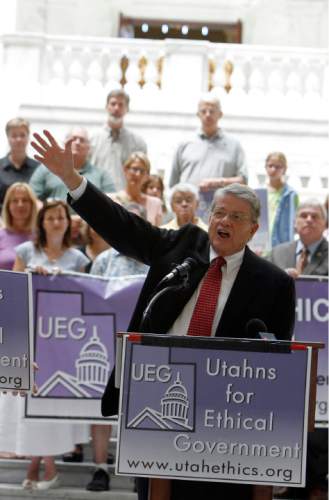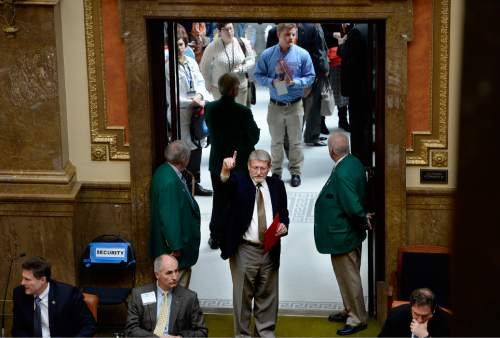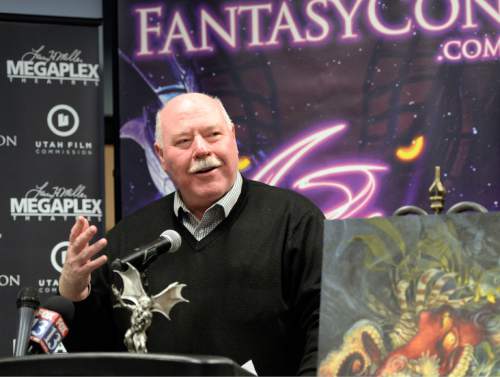This is an archived article that was published on sltrib.com in 2015, and information in the article may be outdated. It is provided only for personal research purposes and may not be reprinted.
Has Utah reached a point where a city needs a high-powered lobbyist to survive and prosper?
Yes, say West Jordan leaders.
The state's fourth-largest city has decided to substantially expand its lobbying prowess — more than doubling its spending on contract lobbyists — to the tune of $230,000 for the coming 12 months.
City leaders pointed to other Utah municipalities — particularly Sandy — in saying a potent lobbying presence in the state Capitol, in Washington and in corporate boardrooms is no longer an extravagance, it's a necessity.
"I must state that a couple of neighbors to our east have five different firms that represent them and spend over $500,000," West Jordan Mayor Kim Rolfe said in pushing for the contract expansion. "If you look specifically at the transportation funding and some of the other funding that comes from the state, even though they're much smaller than us, they get a lot larger share of those because of the lobbyists that work for them.
"I believe," Rolfe said, "they're worth their weight in gold."
Acting City Manager Bryce Haderlie, who has had a troubled relationship with Rolfe for several months, wholeheartedly agreed with him on this topic.
He told the council how the two lobby firms — first hired by West Jordan last fall for a total of $110,000 — "opened doors of communication with legislators, state agencies and a host of other people that I just don't know how we would ever have access to."
And Haderlie recounted how the firm of Foxley & Pignanelli, whose contract is tripling from its current $60,000, jumped in to stave off a proposal to include a West Jordan site in the prison relocation finalist list.
"There was one night on the prison relocation I literally called these gentlemen and within 20 minutes I had a confirmation to sit down with one of the prison relocation chairmen. That kind of access and coordination is unbelievable. So to put an exact price on that, I don't know how you could do that."
—
Playing the game • Ben Southworth was one of just two members of the City Council to vote against last week's proposal to double up on its lobbying.
His opposition stemmed primarily from the fact the city hasn't yet spelled out its top objectives in the new contracts. He also acknowledges having some heartburn over the expense.
"It gives me pause when I look at that amount of money. It makes me think, 'Is this really the highest and best use of taxpayer dollars?'"
But, like others, he points to Sandy's success in bringing home the bacon.
"I have a hard time playing that game sometimes," Southworth said. "It's how the system works, so we can say it's not fair, we don't like it. But if you don't play it, then you lose.
"I'd prefer it wasn't that way."
Sandy Mayor Tom Dolan was the first Utah mayor to decide that a big lobbying team was the key to success. He said he figured out, about three years after he was first elected in 1994, that running herd on the 104-member Legislature was too big a job for any mayor, and hired his first lobbyist.
His city, Utah's sixth largest, has for years fielded the biggest crew of any local government in the state Capitol, currently weighing in at 13. The lobbyists include a former House speaker (Greg Curtis), a former Senate majority leader (Craig Peterson), two other former lawmakers and a host of other politically connected players, including a former legal counsel to the governor and chief of staff to the House speaker.
The city also has long hired a Washington, D.C., firm to deal with federal issues — all of which adds up to a bill of around $500,000.
Dolan offers no apologies for the strategy.
Cities lack the sophistication needed to effectively deal with the state Legislature and a Congress that have become much more complex, he said. "You need professional help."
Lobbyists not only help with things like funding road projects — Sandy got millions for the reconstruction of 1300 East, for example — but also staying alert to proposed changes in state law that affect local governments.
"A lot of things you do in the Legislature are defensive," Dolan said, pointing to an estimated 80 bills in the last session with ramifications for municipalities.
—
Foxley & Pignanelli • Frank Pignanelli, a former House minority leader who is a partner in the lobby firm whose contract is being tripled by West Jordan, points to Dolan as the "game changer," even "a visionary" in the way Utah municipalities interact with other levels of government and business.
"Sandy really ramped it up and look at all the good things that came their way," said Pignanelli. "A lot of transportation projects to smooth economic development. You gotta believe that the Real [Rio Tinto] stadium didn't just happen because. Dolan's really good, but he has a lot of horsepower too. There was a huge team up at the Capitol to ensure those incentives were in place to help the city out."
Pignanelli's firm has a client list approaching 50, mostly businesses. West Jordan is the first big city on the list (which just was added Friday after The Salt Lake Tribune pointed out the firm wasn't registered as representing West Jordan, in a violation of state lobbyist law).
Josh Kanter, head of the Alliance for a Better Utah, which focuses on government ethics and related issues, said it strikes him that local governments may be following the corporate model of "whoever can afford the most lobbyists wins."
"It's unfortunate that the cities need to do that, not to say I don't understand why."
None of the West Jordan Council members or council candidates reached by The Tribune opposed the increasing use of lobbyists to advance city interests.
But Zach Jacob, a candidate in District 3, said while he understands the need, "what I don't understand is why it's going to cost us so much more this year compared to last year."
"I believe the city council and staff owe it to the residents to delineate exactly what return the city received on its investment last year," he said. "What exactly do we have to show for it? And subsequently, what exactly do we expect to get back as [return on investment] on this year's increase?"
Haderlie and Rolfe credit lobbyists last legislative session for helping fend off the prison relocation and changing protectionist laws for new car dealers that prevented West Jordan and others from attracting such businesses. The expectations for results during the coming months and in the 2016 legislative session are not clearly defined in the city's new expanded contracts with the lobby firms.
—
Leveraging relationships • RRJ Consulting, the city's other lobbying firm, is responsible for handling its transportation issues.
Everything else falls to Foxley & Pignanelli, which promises to continue working to help locate an auto mall in the city, gain voter approval of a proposed sales-tax increase for local roads and transit, fund improvements to Airport No. 2, and help the city navigate proposals to change its form of government and manage public relations and communication with residents.
Throughout its proposal to the city, the firm repeatedly talks about "leveraging its relationships" — relationships with the Legislature, congressional delegation, the Governor's Office of Economic Development, developers, the League of Cities and Towns and even the news media (Foxley & Pignanelli point to their representation of the Utah Media Coalition as a lobby client and Pignanelli's weekly column for the Deseret News.)
"That's a phrase," Pignanelli said of the leveraging relationships line, "we use to say, OK, we've been out doing this for a long time and we know a lot of people."
"We're good at schmoozing but we're going to do a lot more than schmoozing. We're going to help them a lot with how they interact with their constituents, but also how they interact with others. We're very much into political research and things like that where we'll be helping them also."
Former legislator and state school board Chairman Kim Burningham has long been an advocate for government ethics reforms.
He said lobbyists' pitch of leveraging relationships and providing access to decision makers is "probably all true, but it's sad in a way."
"This indicates how much power lobbyists have at the Legislature. [Cities] are doing it because they want their message to be heard and they've found it an effective way to get the legislators to listen. That just seems to grate against my soul a bit," Burningham said. "But I understand why they're doing it."
Lobbyists for Utah's biggest cities
Sandy 13.
West Jordan 7
West Valley City 6
Salt Lake City 4
Ogden 4
Taylorsville 4
South Jordan 4
Orem 2
Layton 2
Provo 0
St. George 0
Source: Utah lieutenant governor's office







